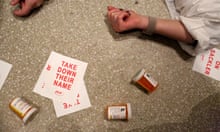Executives from several large healthcare companies and state attorneys general were progressing toward what is expected to be a multibillion-dollar deal to resolve the sprawling litigation over the US opioid epidemic, a plaintiffs’ lawyer said on Friday.
“I think we can get a long way,” said Peter Weinberger, co-liaison counsel in the litigation, in response to a reporter asking if a deal was possible on Friday.
Weinberger said US district judge Dan Polster was shuttling between healthcare executives and state attorneys general and other plaintiffs’ lawyers who were huddled privately in separate rooms in the federal courthouse in Cleveland, Ohio.
Polster summoned executives from McKesson, Teva Pharmaceutical Industries, Cardinal Health and AmerisourceBergen to his court to try to hammer out a deal before a landmark trial is scheduled to start there on Monday.
Polster is overseeing thousands of lawsuits stemming from the US opioid addiction crisis that allege the companies fueled a healthcare crisis responsible for roughly 400,000 US deaths from 1999 to 2017, according to government statistics.
Jury selection was completed this week, even as the major drug distributors and prescription painkiller manufacturers pressed for a settlement.
Polster denied defendants’ request to delay the trial over fears that the jury pool could be tainted by reports that five pharmaceutical companies involved – drug distributors AmerisourceBergen, Cardinal Health and McKesson, as well as drug makers Johnson & Johnson and Teva – had tentatively agreed a $50bn settlement.
Opening arguments in the test case, involving claims brought by Ohio’s Cuyahoga and Summit counties that the drug industry created “a public nuisance”, are expected on Monday, but parties appeared on Friday to be scrambling to agree a pre-trial resolution.
Amid tense negotiations, a statement from lawyers for nearly 2,6000 plaintiffs said earlier in the week that reports that they “tentatively support” a proposed settlement were inaccurate.
“Our priority when assessing settlement proposals is to ensure they will provide urgently needed relief in the near term and that these resources will be directed exclusively toward efforts to abate the opioid epidemic,” the statement read.
The approach of the trial comes as a new study put the cost to the US economy of the opioid crisis at $631bn from 2015 through last year.
The Society of Actuaries said the biggest component of the costs over the four-year period is unrealized lifetime earnings of those who died from the drugs, followed by healthcare costs.
The report found that governments bear less than one-third of the financial costs, while the rest fell on individuals and the private sector. A separate study by the US Centers for Disease Control and Prevention put the cost for 2013 alone at $79bn.
The rising cost of the crisis is attributed to fentanyl and other powerful synthetic opioids contributing to a higher number of deaths. The toll rose though 2017 before leveling off last year at about 47,000 annually.
But a study by the White House council of economic advisers put the costs higher, at just over $500bn a year, because it placed a higher value on lives lost. For 2019, the council put the cost at between $171bn and $214bn.
Earlier this month, bankruptcy proceedings involving another player in the crisis, Purdue Pharma were continuing. The company’s declaration in September that it was seeking chapter 11 bankruptcy protection promptly took it out of the legal cases where it had been the most prominent defendant, known for its branded prescription opioid OxyContin, which has been described by critics as “heroin in a pill” and a prime player in the public health crisis.
Billionaire members of the Sackler family who wholly own privately held Purdue Pharma have also argued that they should not now be part of the sprawling litigation, having been sued personally in addition to the claims against their company.
At a bankruptcy court hearing in White Plains, New York, last week, the US art photographer Nan Goldin and activists from the groups Pain and Truth Pharm held a protest and claiming that victims of the crisis are in danger of being forgotten, amid a separate offer from the company and family to settle all claims for a deal said to be worth $10bn to $12bn, a figure loudly disputed by critics.
During the demonstration, the activists tossed fake blood-soaked $1 bills featuring the slogan “In Pharmacy We Trust” into the air to represent the billions in profits that Purdue and leading Sackler family members have made from their potent narcotics.
“The proposed Purdue bankruptcy settlement is a hoax,” Pain said in a statement. “The Sacklers claim their offer is worth $10bn – but in reality, the money is fake. Its value is speculative, based on future sales of OxyContin, and will not materialize for at least seven years.”
New York’s attorney general, Letitia James, added her voice in opposition to the settlement. “While the Sacklers continue to lowball victims and skirt a responsible settlement, we refuse to allow the family to misuse the courts in an effort to shield their financial misconduct,” she said.
A further battle for Pain activists is to ensure that money raised from legal action will be used for educational and treatment programs, in addition to compensation the victims or their families, and not diverted by states and local governments to their budgets.








